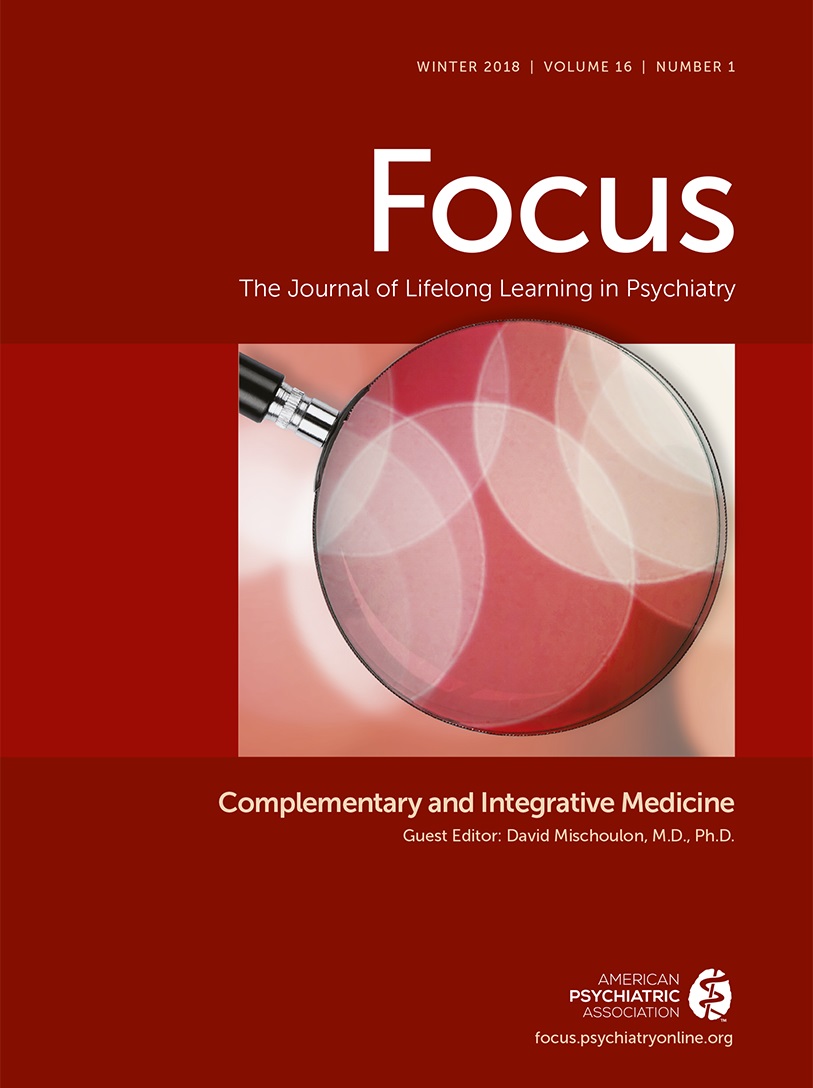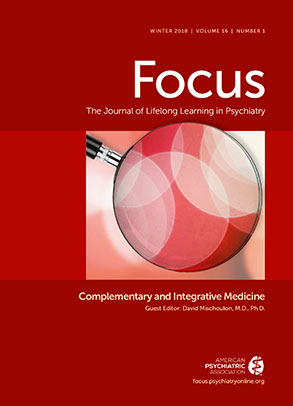As described earlier, MBIs have been shown to be efficacious at reducing the risk of depression relapse and reducing symptoms among patients across multiple psychiatric disorders. However, these efficacy trials do not indicate how these interventions lead to symptom resolution. Considering the support for MBI, researchers have begun to examine the mechanisms that may lead to symptom change in the context of these interventions. These investigations include the examination of psychological, cognitive, and neural mechanisms, which are reviewed next.
Cognitive and Psychological Mechanisms
Individuals with recurrent depression are particularly vulnerable to depressogenic cognitions (
45). Stressful life events or other triggers in everyday life may give rise to well-rehearsed negative thinking patterns such as depressive rumination, worry, and self-criticism, which, if persistent, may escalate to depressive relapse or other psychiatric symptoms. The theoretical model on which MBCT is based (
2) emphasizes identifying these thinking patterns as they arise and viewing them as temporary mental phenomena rather than as facts or realities to be identified with or reacted to (a process referred to as meta-awareness, sometimes used interchangeably with decentering) (
2,
45).
Coupled with an accepting, nonjudgmental, and nonreactive attitude, these processes are viewed as key mechanisms that contribute to “loosening the grip” of the negative thinking patterns. Research has largely supported this notion and has shown that these processes are central components and active ingredients of MBCT. Following MBCT training, participants exhibit improved self-reported mindfulness (
46–
53), reduced rumination (
46,
48–
51,
54–
56) and worry (
46,
50,
56), improved meta-awareness (
55,
57,
58), increased self-compassion (
59,
60), and reduced emotional reactivity (
61). Moreover, these improvements at least partially mediated or predicted the effect of MBCT on treatment outcome (for reviews, see
45,
62,
63), with the strongest effects found for mindfulness, rumination, worry, and emotional reactivity.
The vulnerability of individuals with recurring depression to have depressogenic cognition is additionally exacerbated by impaired cognitive functioning and diminished cognitive resources. These individuals often exhibit overgeneral autobiographical memory (a difficulty in retrieving specific personal events), impairments in attention regulation, and difficulties suppressing competing or currently-irrelevant thoughts and mental sets, among other cognitive deficits (
64–
69). Research indicates that MBCT may attenuate these symptoms. MBCT has been shown to reduce overgeneral autobiographical memory (
58,
70,
71), improve attention deployment and maintenance during sad mood (
72), and reduce attentional-bias toward negative emotional stimuli (
47), although such attentional improvements are not ubiquitous (
45,
51,
73).
MBCT has additionally been shown to augment suppression of currently irrelevant mental sets (
74) and to promote both cognitive flexibility and overall cognitive functioning (Shapero BG, Greenberg J, Mischoulon D, et al., submitted manuscript, 2017), benefits that correlate with a reduction in depressive symptomology. Studies examining other MBIs with healthy participants similarly indicated improvements in cognitive abilities, such as working memory (
75,
76), cognitive flexibility (
77,
78), and inhibition (
79), with very limited evidence regarding attentional improvements (for a review, see
73). Although the specific impact of these cognitive improvements has yet to be established, such cognitive faculties are important factors in facilitating the disengagement from negating thinking patterns associated with depression and may be vital in addressing the cognitive deficits associated with numerous clinical conditions.
Importantly, much of the research on the mechanisms through which MBIs work has been focused on the treatment of depression or depression relapse. However, many of the potential psychological mechanisms cut across disorders. That is, the mindfulness training and skills taught in MBIs are not necessarily aimed at one psychiatric phenomena or condition but are rather focused on modifying processes that potentially underlie many psychiatric disorders. For example, perseverative cognitions such as worry and rumination occur in many forms of psychopathology, including mood and anxiety disorders, eating disorders, and obsessive-compulsive disorder (
80). MBIs attempt to train individuals to develop a different relationship with their thoughts by developing the skill to notice one’s thoughts and then practice different strategies to distance oneself from these thoughts. In this manner, the mechanisms through which MBIs reduce symptoms are through meta-awareness, altering one’s perspective of the self, and self-awareness as some examples (
81–
86).
Another transdiagnostic mechanism through which MBIs may work is through enhancing emotion regulation strategies. Emotion regulation deficits, or emotion dysregulation, occur across psychiatric disorders (
87). Through repeated meditation practices, MBIs develop body awareness, self-regulation, and emotion regulation skills (
81–
86). The nonjudgmental stance conveyed across MBIs allows participants to recover from one’s emotional state more quickly and increases the flexibility through which one can respond to stressful events (
76). Finally, numerous other transdiagnostic mechanism models include self-transcendence, exposure, relaxation, nonattachment, ethical practice, and clarification of values (
81–
86).
Neural Mechanisms
The effects of mindfulness and meditation training on the brain have been investigated in more than 100 brain imaging studies, which can be divided into two categories: structural and functional. Structural brain imaging, typically with magnetic resonance imaging, provides a high-resolution, three-dimensional image of the brain from which various features of brain anatomy can be quantitatively measured, such as cortical thickness, volume of various subcortical areas, degree of gyrification, and so forth. Functional brain imaging instead measures brain function, or brain activation, over time during a specific task or prescribed state (“resting state”). These two methods provide distinct yet complementary information about the brain, and both have been used to assess the effects of meditation on the brain.
Structural brain imaging.
Early studies used a cross-sectional design to compare individuals with long-term meditation experience (“meditators”) with individuals without meditation experience; these participants were matched for age, gender, education, and other relevant variables. Fox and colleagues (
88) systematically reviewed this literature and conducted a meta-analysis of 21 neuroimaging studies that examined roughly 300 meditation practitioners. They found that eight brain regions were consistently altered in meditators, including areas associated with meta-awareness (frontopolar cortex-Brodmann area 10), exteroceptive and interoceptive body awareness (sensory cortices and insula), memory consolidation and reconsolidation (hippocampus), self- and emotion regulation (anterior and mid cingulate; orbitofrontal cortex), and intra- and interhemispheric communication (superior longitudinal fasciculus; corpus callosum), with a global “medium” effect size (
88).
Although the above cross-sectional comparisons were intriguing, they could not prove that meditation training caused the observed changes. Indeed, it could have been the case that meditators possessed distinct features of brain anatomy for reasons other than meditation (genetic, environmental). Therefore, the most compelling evidence for the effects of mindfulness meditation training on the brain comes from longitudinal studies, in which participants are evaluated at multiple time points as they engage in meditation training (preferably starting before their first exposure to meditation).
For example, Hölzel and colleagues (
89) reported a pre-post increase in gray matter concentration within the hippocampus, the posterior cingulate cortex, the temporo-parietal junction, and the cerebellum after a standard eight-week MBSR course in healthy participants who were stressed (
89). They also found that participants reported significant reduction in perceived stress that correlated positively with decrease in gray matter density in the right basolateral amygdala (
90). These various brain regions have been associated with learning and memory processes, emotion regulation, self-referential processing, and perspective taking. However, it has not been investigated whether the structural changes corresponded to behavioral functional changes; therefore, these findings should be interpreted with caution.
The structural changes observed longitudinally after MBSR did not involve the same brain regions as those observed cross-sectionally between long-term meditators and matched control participants. Therefore, it is too early to draw firm conclusions regarding the effects of meditation on brain structure.
Functional brain imaging.
The effects of mindfulness meditation practices on brain function have been more broadly studied than their effects on brain structure. However, the picture to date is more complex in the evidence of functional changes compared with those of structural changes. Across studies, meditators have been asked to perform a great variety of tasks while receiving a functional magnetic resonance imaging scan, spanning such varied domains as cognitive (attention, memory, executive function), affective (emotion regulation), and of other self-related processes (rumination).
A recent review analyzed 78 functional neuroimaging (functional magnetic resonance imaging and positron emission tomography) studies of meditation and used activation likelihood estimation to conduct a meta-analysis of 257 activation peak locations from 31 experiments involving 527 participants (
91). This meta-analysis covered various meditation practices, which the authors categorized into four main types (focused attention, mantra recitation, open monitoring, and compassion-loving-kindness meditation) and three additional types that have been less studied (visualization, sense-withdrawal, and nondual awareness practices). The authors found several brain areas to be recruited consistently across multiple types of meditation practice: insula, presupplementary and supplementary motor cortices, dorsal anterior cingulate cortex, and frontopolar cortex. However, the authors concluded that “convergence is the exception rather than the rule” (
91).
In conclusion, more studies are needed to determine specific neural changes attributable to mindfulness meditation, especially in clinical populations that are increasingly receiving meditation-based interventions, with growing evidence of efficacy, especially for anxiety, depression, and pain (reviewed in
92). In line, different types of meditation practices may influence different brain structures. It is important to carefully and consistently define the type of meditation practices studies because this may influence interpretations and consolidation of the literature examining the effects of mindfulness on neural changes. It is also important that future studies use a hypothesis-driven approach in which specific functions are tested both behaviorally and neurally.

